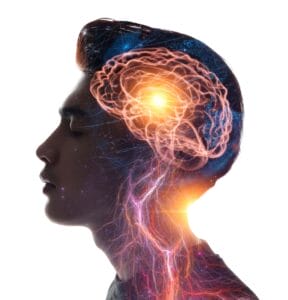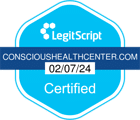For more than 50 years, doctors and veterinarians in the U.S. have used ketamine to sedate their patients prior to surgery. Over the past two decades, use of the drug has expanded into the mental health field. Backed by research that documents its benefits, clinicians have begun to incorporate it into treatment for a variety of psychological concerns, such as using ketamine for depression.
Science Behind Ketamine on the Brain
 Ketamine is classified as a dissociative anesthetic. This means that its effects include deep relaxation, loss of consciousness, minimized sensitivity to pain, and memory loss. It can also cause people to experience a sense of detachment from their body, mind, and/or environment.
Ketamine is classified as a dissociative anesthetic. This means that its effects include deep relaxation, loss of consciousness, minimized sensitivity to pain, and memory loss. It can also cause people to experience a sense of detachment from their body, mind, and/or environment.
Experts have long been aware of what happens when a person takes ketamine – but the question of how the drug causes those effects has yet to be definitively answered. Two recent studies involving animals suggest that altered neural functioning and changes in neurotransmitter levels may be involved.
A November 2022 study in the journal Nature Neuroscience found that ketamine may cause its effects by altering neural networks within the brain’s cerebral cortex. This study, which involved mice, revealed that ketamine caused some neurons to cease functioning while prompting others to become active.
“It’s possible that this new network induced by ketamine enables dreams, hypnosis, or some type of unconscious state,” one of the study’s co-lead authors, Joseph Cichon, MD, PhD, said in a Penn Medicine News release about the research. “And if that is determined to be true, this could also signal that it is the place where ketamine’s therapeutic effects take place.”
In December 2023, the journal Cell Reports published a separate study that also used mice to explore the mechanism through which ketamine affects the brain.
Those researchers found that continued ketamine exposure affects dopamine neurons in two parts of the brain:
- It decreases dopamine neurons in midbrain areas that are involved with mood regulation.
- It increases dopamine neurons in the hypothalamus, an area of the brain that controls metabolism and maintains homeostasis (a state of internal equilibrium).
“The restructuring of the brain’s dopamine system that we see after repeated ketamine use may be linked to cognitive behavioral changes over time,” Malika Datta, one of the study’s co-authors, said in a Columbia News article.
How Does Ketamine Effectively Treat Depression?
Many patients who have received ketamine for depression experience significant reductions in symptoms in a remarkably short period of time.
For example, in a May 2019 study involving more than 400 participants with treatment-resistant depression, those who received ketamine achieved a “clinically meaningful and statistically significant improvement” in symptoms (as scored on the Montgomery-Åsberg Depression Rating Scale, or MADRS) after 28 days of twice-weekly doses.
The authors of this study also reported that the ketamine patients’ MADRS scores demonstrated a “clinically meaningful treatment difference” after only two days of treatment.
These are remarkable results, especially when compared to the effects of more traditional antidepressants, such as selective serotonin reuptake inhibitors (SSRIs).
Patients typically have to take SSRIs for six to eight weeks before they begin to experience symptom reduction – and at least 30% of people who use SSRIs receive no benefit at all from these meds.
Why is ketamine for depression so effective?
According to Bradley Miller, a psychiatrist and neuroscientist with Columbia University, research into ketamine’s effects on dopamine levels may point to the answer to this question.
“[The December 2023] study reveals how ketamine rewires the brain with repeated use,” Miller told Columbia News. “This is an essential step for developing targeted treatments that effectively treat depression without some of the unwanted side effects of ketamine.”
Other studies suggest that ketamine’s ability to rapidly reduce depression symptoms is related to the drug’s impact on glutamate levels in the central nervous system. Glutamate is an excitatory neurotransmitter, which means that it stimulates neurons to deliver messages more rapidly throughout the body.
Prior research has found that many people with depression have lower glutamate levels or less sensitive glutamate receptors, when compared with individuals with no history of depressive disorders.
What to Expect During Your Ketamine Session for Depression at Conscious Health
Patients who receive ketamine for depression at Conscious Health may do so in one of three ways:
- A nasal spray that contains a ketamine variant called esketamine
- Oral arketamine (another ketamine variant) in pill form
- Ketamine infusions via intravenous (IV) injection
If you receive esketamine via nasal spray or arketamine in a pill, you will administer the medication yourself while being supervised by an experienced professional.
During a ketamine infusion session, you will sit or recline in a comfortable chair while a treatment professional places a small needle in your arm. The infusion process usually lasts about 40 minutes. Throughout this time, a member of your treatment team will remain with you to monitor your vital signs and ensure that you don’t experience any upsetting side effects.
In addition to receiving ketamine, you will also participate in an individual psychotherapy (talk therapy) session. Therapy can help you process your experience with ketamine and address your struggles with depression. Participating in therapy while you are still feeling the effects of ketamine will hopefully allow you to be more open and receptive, which can empower you to make significant progress toward a healthier and more satisfying future.
Contact Conscious Health to Start Ketamine Therapy for Depression Today
Conscious Health offers a ketamine therapy and a dynamic array of other innovative, evidence-based services for adults who have been living with depressive disorders and other mental health concerns.
At our depression treatment center in Los Angeles, California, you will have the opportunity to work in close collaboration with a small team of experienced and compassionate caregivers. We will take the time to get to know you as a unique individual, so that we can be sure we’re providing you with the focused care that best aligns with your needs, goals, and preferences.
To learn more about ketamine therapy at Conscious Health, or to schedule a free assessment, please visit our Contact page or call us today.



